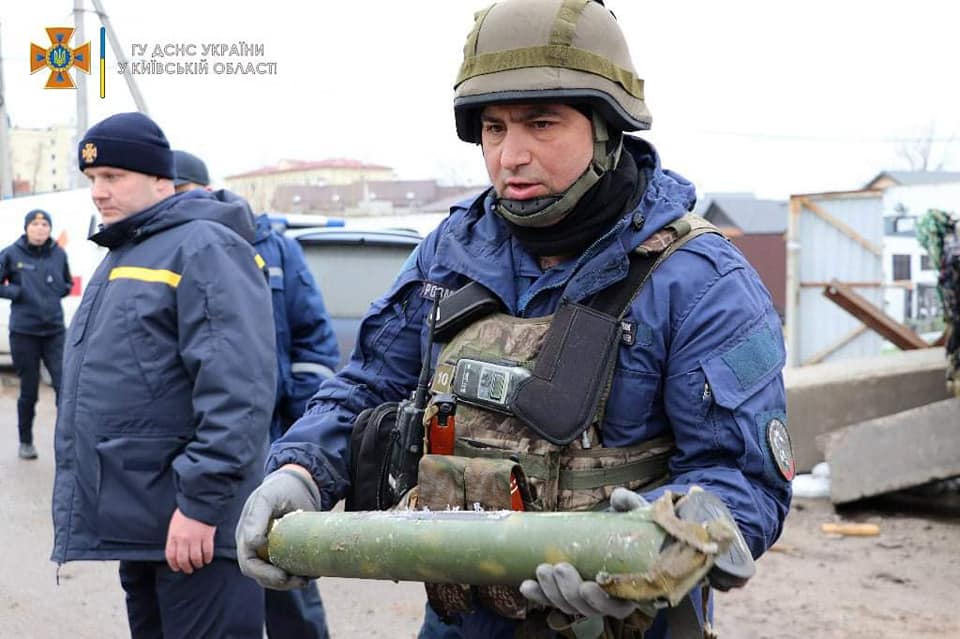Kyiv Goes on the Offensive

It looks like the Ukrainian armed forces are conducting successful advances in the Kyiv region, including the reclamation of the Chernobyl nuclear power plant. The Russian withdrawal has exposed the devastation of the advance, both in terms of the damage inflicted on Ukrainian civilians and on the desperate straits of the Russian army. The scenes from Bucha are altogether horrific, but as I always I want to issue a warning of extreme caution with respect to the first reports we get out of conflict zones.
With respect to what we’re going to see next the question seems to be whether Russian forces are “regrouping” or “retreating” but honestly in the Kyiv area the answer seems to be “routing.” The equipment losses are so significant that it does not seem like the forces withdrawn from the area will be able to have consequential effect in the Donbass region, and in any case the Ukrainians enjoy interior lines of communication and have recently re-opened rail and road lines along the Russia-Ukraine border. The advance in the south seems stuck although the Ukrainians have not yet been able to retake Kherson.
Looking forward, it’s tough for me to conclude that the balance of capabilities is going to favor Russia. Russia has not been able to destroy the Ukrainian army or to seize territory that would be sufficient to force a Ukrainian capitulation. It’s hard to know how much more the Russians have in the tank with respect to equipment, and how fast Russian industry can replace losses, but my guess as to both is “not much and not very fast.” The former assessment is based on the difficulty of getting mothballed equipment into service, especially if that equipment has been kept in poor repair; the latter is based on how productive the Russian defense industrial base has been over the last two decades, which is “not very.” The Ukrainians, on the other hand, are able to replace their losses with supplies from the West. Unless China intervenes with arms transfers in a big way it’s hard to escape the conclusion that the Ukrainians will grow stronger while the Russians grow weaker.
The helicopter raid on Belgorod is a head scratcher. There’s no question that two helicopters struck and destroyed a fuel depot across the Russian border in Belgorod, and the Russians are blaming Ukraine. For their part the Ukrainians have been issuing some non-denial denials. We’re seeing the usual claims about Russian “false flags,” but I don’t get that; if you’re going to do a false flag at the very least you murder some innocent Russian civilians in order to affect public opinion. Destroying a legitimate military target in the area of operations without loss of life? Doesn’t make any sense to me. Some folks are saying that the Ukrainians aren’t claiming responsibility because the attack might activate some diplomatic agreements between Belarus and Russia, which I suppose makes sense in a “doesn’t make much sense” kind of way. To follow that a bit farther it’s possible that Ukraine wants to signal restraint to the West, alleviating concerns that Western weapons will be used to launch attacks into Russia.
You just really have to wonder how this is playing in the Kremlin. There isn’t much indication thus far that Russian public opinion will act as any meaningful constraint on Russian military behavior. Still, the abject defeat and destruction of considerable portions of the Russian army is bound to have some impact on Putin’s popularity, as will the ongoing damage caused by the sanctions. Russian economic and financial mediation has done okay at limiting the impact thus far, but especially as the weather warms in Europe it’s going to be impossible to escape severe damage to the Russian economy.
Some links…
- The Tankie line on the Ukrainian victory at Kyiv has become “it was just a feint.” This is utter nonsense.
- Czech BMPs on their way to Ukraine. Also Australian Bushmasters.
- Looks like Finland will join NATO. In light of Russia’s actions I’d hope that this will be uncontroversial, but of course it won’t be.
- This war will have a dramatic impact on global food prices.
- The New Russian exile community. And the last train out of Russia…
Finally, some thoughts at 1945 on how this impacts Russia’s long-term arms export ambitions:
Potential buyers of Russian equipment have to ask themselves some very difficult questions. Russia will undoubtedly devote much of the capacity of its defense industrial base (DIB) to recapitalizing its forces, given the losses in Ukraine. When Russian needs to compete with those of the export market, who will win? Countries that buy Russian weapons will also face sanctions that could prevent them from accessing Western arms markets, and could even have a serious negative effect on their ability to use the US dollar. Russian technicians and engineers, necessary to upgrading and maintaining much-exported equipment, may face sanctions of their own including travel restrictions.


